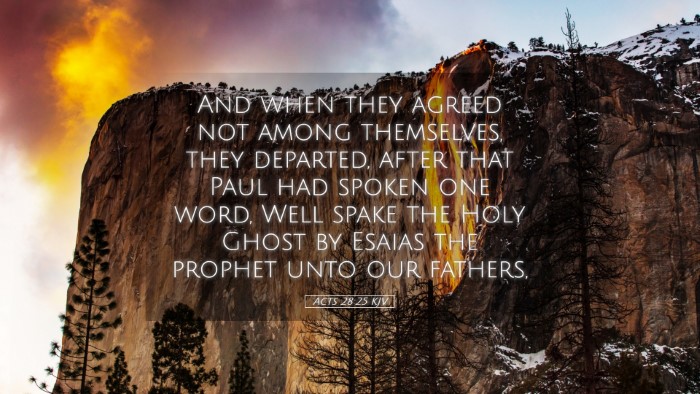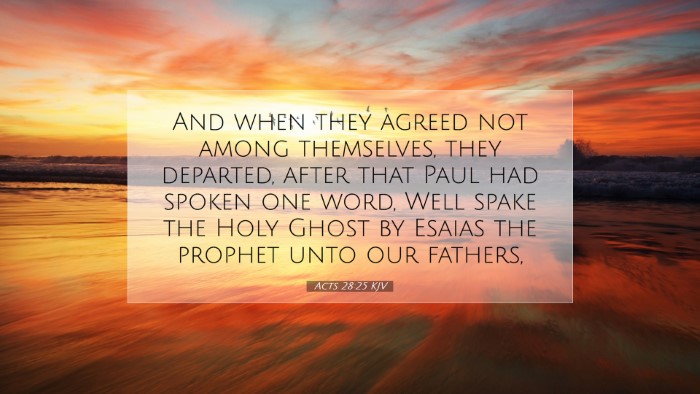Commentary on Acts 28:25
The passage in Acts 28:25 states:
“And when they agreed not among themselves, they departed, after that Paul had spoken one word, Well spake the Holy Ghost by Esaias the prophet unto our fathers.”
Contextual Background
This verse lies within the concluding chapter of the Book of Acts, which narrates the final days of the Apostle Paul and his ministry in Rome. It is crucial to understand the circumstances that led to this moment. Paul, having been placed under house arrest, calls together the leaders of the Jews in Rome to explain his mission and defense.
Insights from Commentaries
The following insights are drawn from public domain commentaries to provide a comprehensive understanding of Acts 28:25.
Matthew Henry’s Commentary
Matthew Henry observes that the division among the listeners reflects a broader theme in the New Testament: the varied reception of the Gospel message. He points out that it was typical for the Jewish leaders to express disbelief despite the clear testimonies and miracles performed by Jesus and His apostles. Henry emphasizes:
- The Prophetic Fulfillment: Henry notes that Paul invokes Isaiah to underline the continuity of God’s message from the Old Testament to the New, indicating that their rejection was not new but predicted.
- The Role of the Holy Spirit: Highlighting Paul's assertion of the Holy Spirit's testimony, he insists this is God's active communication, showing that the rejection of the message was ultimately against God's will.
- Unity in Diversity: He discusses how the disagreement showcases the challenges of unity in faith despite the diverse backgrounds and understandings of the Jewish leaders.
Albert Barnes’ Notes on the New Testament
Albert Barnes contributes further by analyzing the theological implications of the disagreement among the Jewish leaders. He notes:
- Human Responsibility: Barnes argues that the refusal to accept the message places responsibility on those who heard the Gospel, indicating that knowledge brings accountability.
- The Purpose of the Prophets: He highlights how Paul's reference to the prophet Isaiah serves to remind them that their own scriptures foretold the challenges ahead for God’s messengers.
- Challenge of Hardness of Heart: Barnes reflects on the scriptural context of Isaiah, highlighting the theme of spiritual blindness which serves as a cautionary tale for all who hear the word but do not embrace it.
Adam Clarke’s Commentary
Adam Clarke provides a more historical and cultural perspective on this passage. His insights include:
- Cultural Dynamics: Clarke discusses the cultural and religious dynamics in Rome, which influenced the Jewish leaders' reception of Paul’s message. He emphasizes the entrenched traditions of the Jews and their resistance to the changes brought by Christianity.
- Paul’s Methodology: Clarke points out Paul’s effective use of scripture to communicate truth, urging believers to use the Word of God as a foundational tool for evangelism.
- Divine Sovereignty: He notes that God's purpose persists despite human opposition, reinforcing the belief that God's plan cannot be thwarted by resistance.
Theological Implications
The rejection of Paul’s message by some Jewish leaders invites several theological discussions pertinent to contemporary Christian thought:
- Continued Relevance of Prophecy: The use of Isaiah signifies that God’s plans are enduring, and His words still resonate with contemporary believers.
- Understanding Resistance to the Gospel: This verse illustrates the persisting challenge of evangelism, indicating that the hardening of hearts is not a new phenomenon.
- Role of the Holy Spirit: The mention of the Holy Spirit emphasizes the divine influence and presence in the hearts of believers as they proclaim the Gospel.
Practical Applications
For pastors, students, and theologians, Acts 28:25 carries several practical applications:
- Preaching with Authority: Just as Paul utilized Scripture with authority, modern preachers are called to do the same, recognizing the weight and timelessness of biblical truth.
- Handling Opposition: This passage serves as encouragement for those facing disunity or opposition in ministry, reminding them of the historical context of such challenges in the early Church.
- Emphasizing the Work of the Holy Spirit: Recognizing that the Holy Spirit actively communicates through the faithful preaching of the Word encourages believers to remain reliant on divine guidance and transformation.
Conclusion
Acts 28:25 encapsulates a significant moment in the early Church, showcasing the struggle of belief amidst the fulfillment of prophetic words. By examining the insights from Matthew Henry, Albert Barnes, and Adam Clarke, we gain a deeper understanding of the complexities involved in the reception of the Gospel. It challenges us to reflect on our own responses to God’s Word and encourages us to remain steadfast in proclaiming the truth, regardless of opposition.


